Frequent persons on Venezuela's street signs
countries
59 names / 257 streets
Simón Bolívar
 50
Simón José Antonio de la Santísima Trinidad Bolívar Palacios Ponte y Blanco was a Venezuelan military and political leader who led what are currently the countries of Colombia, Venezuela, Ecuador,...
50
Simón José Antonio de la Santísima Trinidad Bolívar Palacios Ponte y Blanco was a Venezuelan military and political leader who led what are currently the countries of Colombia, Venezuela, Ecuador,...
Antonio José de Sucre
 26
Antonio José de Sucre y Alcalá, known as the "Gran Mariscal de Ayacucho", was a Venezuelan general and politician who served as the president of Bolivia from 1825 to 1828. A close friend and...
26
Antonio José de Sucre y Alcalá, known as the "Gran Mariscal de Ayacucho", was a Venezuelan general and politician who served as the president of Bolivia from 1825 to 1828. A close friend and...
Andrés Bello
 10
Andrés de Jesús María y José Bello López was a Venezuelan humanist, diplomat, poet, legislator, philosopher, educator and philologist, whose political and literary works constitute an important part...
10
Andrés de Jesús María y José Bello López was a Venezuelan humanist, diplomat, poet, legislator, philosopher, educator and philologist, whose political and literary works constitute an important part...
Francisco de Miranda
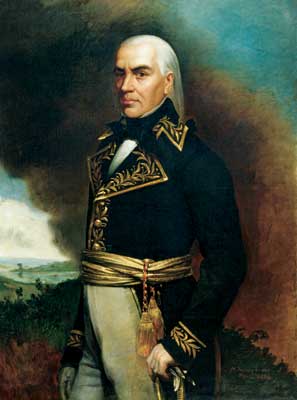 8
Sebastián Francisco de Miranda y Rodríguez de Espinoza, commonly known as Francisco de Miranda, was a Venezuelan military leader and revolutionary who fought in the American Revolutionary War, the...
8
Sebastián Francisco de Miranda y Rodríguez de Espinoza, commonly known as Francisco de Miranda, was a Venezuelan military leader and revolutionary who fought in the American Revolutionary War, the...
Andrés Eloy Blanco
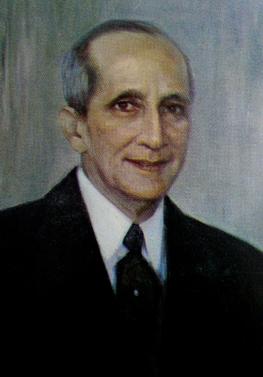 8
Andrés Eloy Blanco Meaño was a noted Venezuelan poet and politician. He was a member of the Generación del 28, and one of the founders of Acción Democrática (AD). He was Minister of Foreign Affairs...
8
Andrés Eloy Blanco Meaño was a noted Venezuelan poet and politician. He was a member of the Generación del 28, and one of the founders of Acción Democrática (AD). He was Minister of Foreign Affairs...
José Antonio Páez
 6
José Antonio Páez Herrera was a Venezuelan leader who fought against the Spanish Crown for Simón Bolívar during the Venezuelan War of Independence. He later led Venezuela's independence from Gran...
6
José Antonio Páez Herrera was a Venezuelan leader who fought against the Spanish Crown for Simón Bolívar during the Venezuelan War of Independence. He later led Venezuela's independence from Gran...
Rómulo Gallegos
 6
Rómulo Ángel del Monte Carmelo Gallegos Freire was a Venezuelan novelist and politician. For a period of nine months during 1948, he governed as the first freely elected president in Venezuela's...
6
Rómulo Ángel del Monte Carmelo Gallegos Freire was a Venezuelan novelist and politician. For a period of nine months during 1948, he governed as the first freely elected president in Venezuela's...
Rose of Lima
 6
Rose of Lima, TOSD was a member of the Third Order of Saint Dominic in Lima, Peru, who became known for both her life of severe penance and her care of the poverty stricken of the city through her...
6
Rose of Lima, TOSD was a member of the Third Order of Saint Dominic in Lima, Peru, who became known for both her life of severe penance and her care of the poverty stricken of the city through her...
Pedro Camejo
 6
Pedro Camejo, also known as Negro Primero, was a Venezuelan soldier that fought with the Royal Army and later with the Independence Army during the Venezuelan War of Independence, reaching the rank...
6
Pedro Camejo, also known as Negro Primero, was a Venezuelan soldier that fought with the Royal Army and later with the Independence Army during the Venezuelan War of Independence, reaching the rank...
Leonardo Ruiz Pineda
 6
Leonardo Ruiz Pineda was a Venezuelan lawyer and politician, member and one of the founders of the party Acción Democrática (AD), of which was Secretary General and leader of the clandestine...
6
Leonardo Ruiz Pineda was a Venezuelan lawyer and politician, member and one of the founders of the party Acción Democrática (AD), of which was Secretary General and leader of the clandestine...
Simón Rodríguez
José María Vargas
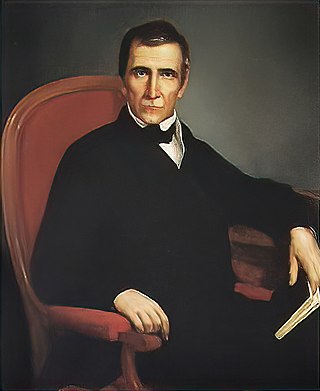 4
José María Vargas Ponce was the president of Venezuela from 1835 to 1836. Vargas was Venezuela's first civilian president.
4
José María Vargas Ponce was the president of Venezuela from 1835 to 1836. Vargas was Venezuela's first civilian president.
Cecilio Acosta
 4
Cecilio Juan Ramón del Carmen Acosta Revete, was a Venezuelan writer, journalist, lawyer, philosopher and humanist.
4
Cecilio Juan Ramón del Carmen Acosta Revete, was a Venezuelan writer, journalist, lawyer, philosopher and humanist.
Rómulo Betancourt
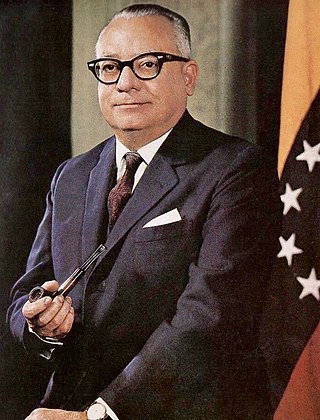 4
Rómulo Ernesto Betancourt Bello, known as "The Father of Venezuelan Democracy", was the president of Venezuela, from 1945 to 1948 and again from 1959 to 1964, as well as leader of Acción Democrática,...
4
Rómulo Ernesto Betancourt Bello, known as "The Father of Venezuelan Democracy", was the president of Venezuela, from 1945 to 1948 and again from 1959 to 1964, as well as leader of Acción Democrática,...
Michael (archangel)
 4
Michael, also called Saint Michael the Archangel, Archangel Michael and Saint Michael the Taxiarch is an archangel in Judaism, Christianity, Islam, and the Baha'i faith. The earliest surviving...
4
Michael, also called Saint Michael the Archangel, Archangel Michael and Saint Michael the Taxiarch is an archangel in Judaism, Christianity, Islam, and the Baha'i faith. The earliest surviving...
Alberto Federico Ravell
 4
Alberto Federico Ravell Arreaza is a Venezuelan journalist, former CEO and co-founder of the news channel, Globovisión. Since 2019 and as of 2020, Ravell served as the director of the National Center...
4
Alberto Federico Ravell Arreaza is a Venezuelan journalist, former CEO and co-founder of the news channel, Globovisión. Since 2019 and as of 2020, Ravell served as the director of the National Center...
Amerigo Vespucci
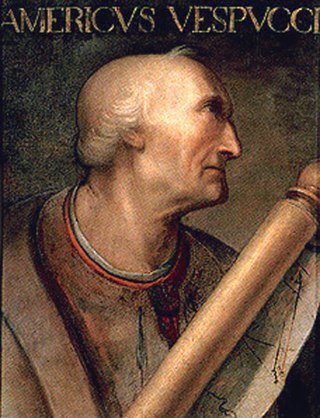 4
Amerigo Vespucci was an Italian explorer and navigator from the Republic of Florence, from whose name the term "America" is derived.
4
Amerigo Vespucci was an Italian explorer and navigator from the Republic of Florence, from whose name the term "America" is derived.
Francisco Salias
 3
Francisco Salias y Sanoja fue un revolucionario venezolano, conocido cómo el prócer de la independencia de Venezuela y ser el célebre por ser quien atajó al capitán general Vicente de Emparan y Orbe...
3
Francisco Salias y Sanoja fue un revolucionario venezolano, conocido cómo el prócer de la independencia de Venezuela y ser el célebre por ser quien atajó al capitán general Vicente de Emparan y Orbe...
Andrés López del Rosario
 3
Andrés López del Rosario o Juan Andrés López del Rosario, más conocido con el apodo de Andresote, fue un zambo cimarrón del siglo XVIII. Dirigió entre 1730 y 1732 una rebelión contra el monopolio que...
3
Andrés López del Rosario o Juan Andrés López del Rosario, más conocido con el apodo de Andresote, fue un zambo cimarrón del siglo XVIII. Dirigió entre 1730 y 1732 una rebelión contra el monopolio que...
Lisandro Alvarado
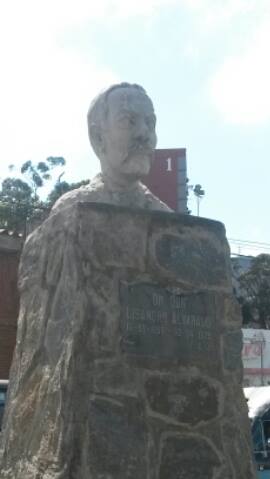 3
Lisandro Alvarado was a Venezuelan medical doctor, naturalist, historian, ethnologist and linguist.
3
Lisandro Alvarado was a Venezuelan medical doctor, naturalist, historian, ethnologist and linguist.
Alexander von Humboldt
 3
Friedrich Wilhelm Heinrich Alexander von Humboldt was a German polymath, geographer, naturalist, explorer, and proponent of Romantic philosophy and science. He was the younger brother of the Prussian...
3
Friedrich Wilhelm Heinrich Alexander von Humboldt was a German polymath, geographer, naturalist, explorer, and proponent of Romantic philosophy and science. He was the younger brother of the Prussian...
Guaicaipuro
 3
Cacique Guaicaipuro was a legendary native (indigenous) Venezuelan chief of both the Teques and Caracas tribes. Though known today as Guaicaipuro, in documents of the time his name was written...
3
Cacique Guaicaipuro was a legendary native (indigenous) Venezuelan chief of both the Teques and Caracas tribes. Though known today as Guaicaipuro, in documents of the time his name was written...
Anthony of Padua
 3
Anthony of Padua, OFM or Anthony of Lisbon was a Portuguese Catholic priest and friar of the Franciscan Order.
3
Anthony of Padua, OFM or Anthony of Lisbon was a Portuguese Catholic priest and friar of the Franciscan Order.
Teresa Urrea
 3
Teresa Urrea, often referred to as Teresita and also known as Santa Teresa or La Santa de Cábora among the Mayo, was a Mexican mystic, folk healer, and revolutionary insurgent.
3
Teresa Urrea, often referred to as Teresita and also known as Santa Teresa or La Santa de Cábora among the Mayo, was a Mexican mystic, folk healer, and revolutionary insurgent.
Leopoldo Sucre Figarella
 3
Leopoldo Sucre Figarella was a Venezuelan politician and engineer of Corsican ancestors. A member of the Sucre family Sucre Figarella served as governor, minister and senator during his long and...
3
Leopoldo Sucre Figarella was a Venezuelan politician and engineer of Corsican ancestors. A member of the Sucre family Sucre Figarella served as governor, minister and senator during his long and...
Daniel Camejo
 3
Daniel Camejo Octavio was a Venezuelan sailor. He competed at the 1960 Summer Olympics with his son Peter Camejo and the 1964 Summer Olympics.
3
Daniel Camejo Octavio was a Venezuelan sailor. He competed at the 1960 Summer Olympics with his son Peter Camejo and the 1964 Summer Olympics.
Antonio Pinto Salinas
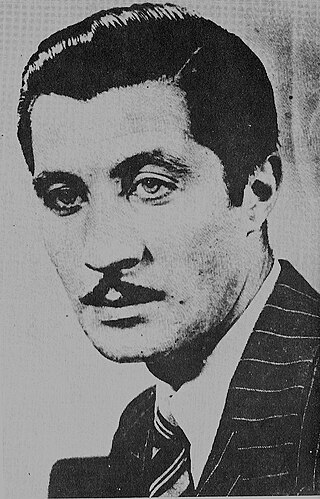 3
Antonio Pinto Salinas fue un poeta y político venezolano, dirigente y secretario general del partido Acción Democrática en la clandestinidad. Fue asesinado por la dirección de Seguridad Nacional en...
3
Antonio Pinto Salinas fue un poeta y político venezolano, dirigente y secretario general del partido Acción Democrática en la clandestinidad. Fue asesinado por la dirección de Seguridad Nacional en...
Eulalia Ramos
 3
Eulalia Ramos Sánchez, también conocida como Eulalia Buroz o Eulalia Chamberlain fue una heroína de la Independencia de Venezuela y miembro del grupo cercano al Libertador Simón Bolívar.
3
Eulalia Ramos Sánchez, también conocida como Eulalia Buroz o Eulalia Chamberlain fue una heroína de la Independencia de Venezuela y miembro del grupo cercano al Libertador Simón Bolívar.
Fabricio Ojeda
 3
Fabricio Ojeda was a Venezuelan journalist, politician, and guerrilla leader. He was the President of the Patriotic Junta that organised the movement to end Marcos Pérez Jiménez' dictatorship...
3
Fabricio Ojeda was a Venezuelan journalist, politician, and guerrilla leader. He was the President of the Patriotic Junta that organised the movement to end Marcos Pérez Jiménez' dictatorship...
Jacinto Lara
 2
Jacinto Lara was a Venezuelan independence leader and hero of the Venezuelan War of Independence. His contribution included participating in Simón Bolívar's 1813 Admirable Campaign. He was briefly...
2
Jacinto Lara was a Venezuelan independence leader and hero of the Venezuelan War of Independence. His contribution included participating in Simón Bolívar's 1813 Admirable Campaign. He was briefly...
Saint Lawrence
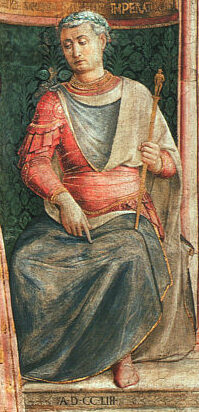 2
Saint Lawrence or Laurence was one of the seven deacons of the city of Rome under Pope Sixtus II who were martyred in the persecution of the Christians that the Roman Emperor Valerian ordered in 258.
2
Saint Lawrence or Laurence was one of the seven deacons of the city of Rome under Pope Sixtus II who were martyred in the persecution of the Christians that the Roman Emperor Valerian ordered in 258.
José de San Martín
 2
José Francisco de San Martín y Matorras, nicknamed "the Liberator of Argentina, Chile and Peru", was an Argentine general and the primary leader of the southern and central parts of South America's...
2
José Francisco de San Martín y Matorras, nicknamed "the Liberator of Argentina, Chile and Peru", was an Argentine general and the primary leader of the southern and central parts of South America's...
Juan Crisóstomo Falcón
 2
Juan Crisóstomo Falcón Zavarce was the president of Venezuela from 1863 to 1868.
2
Juan Crisóstomo Falcón Zavarce was the president of Venezuela from 1863 to 1868.
John Bosco
 2
John Melchior Bosco, SDB, popularly known as Don Bosco, was an Italian Catholic priest, educator and writer of the 19th century. While working in Turin, where the population suffered many of the ill...
2
John Melchior Bosco, SDB, popularly known as Don Bosco, was an Italian Catholic priest, educator and writer of the 19th century. While working in Turin, where the population suffered many of the ill...
George Washington
 2
George Washington was an American Founding Father, military officer, and politician who served as the first president of the United States from 1789 to 1797. Appointed by the Second Continental...
2
George Washington was an American Founding Father, military officer, and politician who served as the first president of the United States from 1789 to 1797. Appointed by the Second Continental...
Pope John Paul II
 2
Pope John Paul II was head of the Catholic Church and sovereign of the Vatican City State from 1978 until his death in 2005.
2
Pope John Paul II was head of the Catholic Church and sovereign of the Vatican City State from 1978 until his death in 2005.
Antonio Guzmán Blanco
 2
Antonio Leocadio Guzmán Blanco was a Venezuelan military leader, statesman, diplomat and politician. He was the president of Venezuela for three separate terms, from 1870 until 1877, from 1879 until...
2
Antonio Leocadio Guzmán Blanco was a Venezuelan military leader, statesman, diplomat and politician. He was the president of Venezuela for three separate terms, from 1870 until 1877, from 1879 until...
Simón Planas
 2
Simón Planas Guaderrama fue un político, estadista y filósofo venezolano. Secretario del Interior, Justicia y Relaciones Exteriores durante la presidencia de José Gregorio Monagas, fue el redactor de...
2
Simón Planas Guaderrama fue un político, estadista y filósofo venezolano. Secretario del Interior, Justicia y Relaciones Exteriores durante la presidencia de José Gregorio Monagas, fue el redactor de...
Fermín Toro
 2
Fermín Toro y Blanco was a Venezuelan humanist, politician, diplomat and author.
2
Fermín Toro y Blanco was a Venezuelan humanist, politician, diplomat and author.
Ezequiel Zamora
 2
Ezequiel Zamora was a Venezuelan soldier and leader of the Federalists in the Federal War (Guerra Federal) of 1859–1863.
2
Ezequiel Zamora was a Venezuelan soldier and leader of the Federalists in the Federal War (Guerra Federal) of 1859–1863.
Louis of Toulouse
 2
Saint Louis of Toulouse, also known as Louis of Anjou, was a Neapolitan prince of the Capetian House of Anjou and a Catholic bishop.
2
Saint Louis of Toulouse, also known as Louis of Anjou, was a Neapolitan prince of the Capetian House of Anjou and a Catholic bishop.
Raphael (archangel)
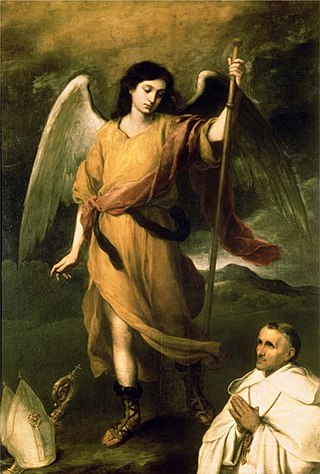 2
Raphael is an archangel first mentioned in the Book of Tobit and in 1 Enoch, both estimated to date from between the 3rd and 2nd century BCE. In later Jewish tradition, he became identified as one of...
2
Raphael is an archangel first mentioned in the Book of Tobit and in 1 Enoch, both estimated to date from between the 3rd and 2nd century BCE. In later Jewish tradition, he became identified as one of...
José Francisco Bermúdez
Diego Bautista Urbaneja
Manuel Piar
 2
Manuel Carlos María Francisco Piar Gómez was General-in-Chief of the army fighting Spain during the Venezuelan War of Independence.
2
Manuel Carlos María Francisco Piar Gómez was General-in-Chief of the army fighting Spain during the Venezuelan War of Independence.
John the Baptist
 2
John the Baptist was a Jewish preacher active in the area of the Jordan River in the early 1st century AD. He is also known as Saint John the Forerunner in Eastern Orthodoxy, John the Immerser in...
2
John the Baptist was a Jewish preacher active in the area of the Jordan River in the early 1st century AD. He is also known as Saint John the Forerunner in Eastern Orthodoxy, John the Immerser in...
Joaquín Sabás Moreno de Mendoza
 2
Joaquín Sabás Moreno de Mendoza, caballero de la Orden de Santiago, fue un militar y colonizador español del siglo XVIII. Se desempeñó como gobernador y capitán general de la Provincia de Margarita...
2
Joaquín Sabás Moreno de Mendoza, caballero de la Orden de Santiago, fue un militar y colonizador español del siglo XVIII. Se desempeñó como gobernador y capitán general de la Provincia de Margarita...
Antonio de Berrio
 2
Antonio de Berrío (1527–1597) was a Spanish soldier, governor and explorer in Colonial America.
2
Antonio de Berrío (1527–1597) was a Spanish soldier, governor and explorer in Colonial America.
Domingo Guzmán Lander
 2
Domingo Guzmán Lander fue un médico y político venezolano.
2
Domingo Guzmán Lander fue un médico y político venezolano.
Guillermo Valencia
 2
Guillermo Valencia Castillo was a Colombian poet, translator, and politician. Valencia was a pioneer of Modernism in Colombia and a member of the Colombian Conservative Party. He was the father of...
2
Guillermo Valencia Castillo was a Colombian poet, translator, and politician. Valencia was a pioneer of Modernism in Colombia and a member of the Colombian Conservative Party. He was the father of...
Saint Peter
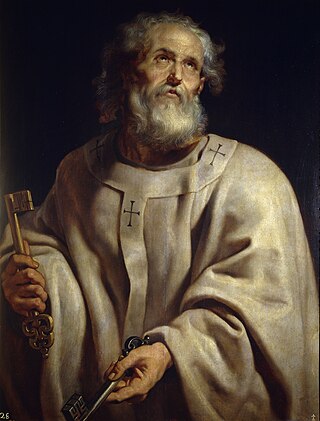 2
Saint Peter, also known as Peter the Apostle, Simon Peter, Simeon, Simon, or Cephas, was one of the Twelve Apostles of Jesus Christ and one of the first leaders of the early Christian Church. He...
2
Saint Peter, also known as Peter the Apostle, Simon Peter, Simeon, Simon, or Cephas, was one of the Twelve Apostles of Jesus Christ and one of the first leaders of the early Christian Church. He...
Saint Joseph
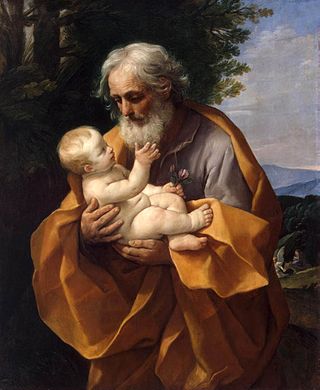 2
Joseph was a 1st-century Jewish man of Nazareth who, according to the canonical Gospels, was married to Mary, the mother of Jesus, and was the legal father of Jesus.
2
Joseph was a 1st-century Jewish man of Nazareth who, according to the canonical Gospels, was married to Mary, the mother of Jesus, and was the legal father of Jesus.
José Antonio Anzoátegui
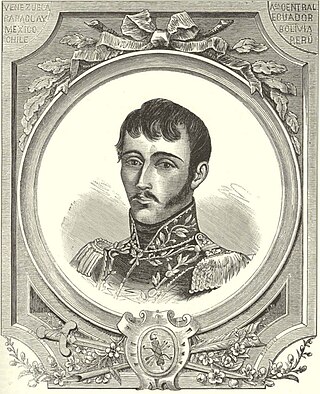 2
José Antonio Anzoátegui (1789–1819) was a Venezuelan military officer who fought in the Venezuelan and Colombian Wars of Independence.
2
José Antonio Anzoátegui (1789–1819) was a Venezuelan military officer who fought in the Venezuelan and Colombian Wars of Independence.
Francis of Assisi
 2
Giovanni di Pietro di Bernardone, known as Francis of Assisi, was an Italian mystic, poet and Catholic friar who founded the religious order of the Franciscans. He was inspired to lead a Christian...
2
Giovanni di Pietro di Bernardone, known as Francis of Assisi, was an Italian mystic, poet and Catholic friar who founded the religious order of the Franciscans. He was inspired to lead a Christian...
Raúl Leoni
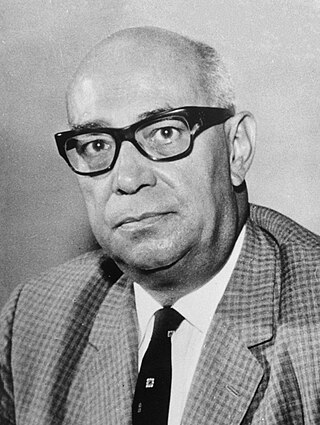 2
Raúl Leoni Otero was the president of Venezuela from 1964 until 1969. He was a member of the Generation of 1928 and a charter member of the Acción Democrática party, and the first Labor minister of...
2
Raúl Leoni Otero was the president of Venezuela from 1964 until 1969. He was a member of the Generation of 1928 and a charter member of the Acción Democrática party, and the first Labor minister of...
Christopher Columbus
 2
Christopher Columbus was an Italian explorer and navigator from the Republic of Genoa who completed four Spanish-based voyages across the Atlantic Ocean sponsored by the Catholic Monarchs, opening...
2
Christopher Columbus was an Italian explorer and navigator from the Republic of Genoa who completed four Spanish-based voyages across the Atlantic Ocean sponsored by the Catholic Monarchs, opening...
José Florencio Jiménez
José María España
 2
José María España Rodríguez del Villar y Sáenz fue un militar y político venezolano, que junto a Manuel Gual, protagonizó la proindependentista conspiración de Gual y España, tras la cual fue...
2
José María España Rodríguez del Villar y Sáenz fue un militar y político venezolano, que junto a Manuel Gual, protagonizó la proindependentista conspiración de Gual y España, tras la cual fue...
Hernán Cortés
 2
Hernán Cortés de Monroy y Pizarro Altamirano, 1st Marquess of the Valley of Oaxaca was a Spanish conquistador who led an expedition that caused the fall of the Aztec Empire and brought large portions...
2
Hernán Cortés de Monroy y Pizarro Altamirano, 1st Marquess of the Valley of Oaxaca was a Spanish conquistador who led an expedition that caused the fall of the Aztec Empire and brought large portions...